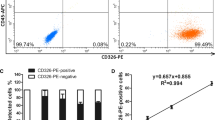Summary
Hematocytometer leucocyte adherence inhibition (LAI) assays were performed with hepatocellular carcinoma (HCC) tissue extract and liver cirrhosis extract as nonspecific antigens. Titration experiments revealed that the optimal extract concentration was 200μ protein/ml. The LAI assays were positive in 28 of 39 HCC cases (71.8%). All three small liver carcinoma cases were positive. LAI assays were negative in all other cancer cases. In the false negative cases (n=11), serum total bilirubin was significantly elevated (p< .05) and the number of peripheral blood lymphocytes significantly decreased (p< .005) compared with the positive cases. LAI assays using extracts of human hepatocellular cell line (HUH-6) as antigen were positive in 18 of 27 (66.7%) patients. The results were negative in all liver cirrhosis patients and normal individuals. Furthermore, LAI assays were negative in all HCC and liver cirrhosis patients with extracts of Grawitz’s tumor cell line. These results show that the hematocytometer LAI assay using a human culture cancer cell line as a tumor antigen might be useful for diagnosing HCC.
Similar content being viewed by others
References
Halliday WJ, Millers: Leucocyte adherence inhibition: A simple test for cell-mediated tumor immunity and serum blocking factor. Int J Cancer 9: 477, 1972
Halliday WJ, et al: Specific Immunodiagnosis of hepatocellular carcinoma by leucocyte adherence inhibition. Brit J Med 2: 349, 1974
Onji M, et al: The immunodiagnosis of hepatocellular carcinoma by leucocyte adherence inhibition test. Acta Hepatica Jpn 19: 805, 1978 (Jpn)
Hirata K: Immunodiagnosis of hepatocellular carcinoma by leucocyte adherence inhibition test and blocking test. Acta Hepatica Jpn 22: 978, 1981 (Jpn)
Onji M: Leucocyte adherence inhibition assay for cellmediated immunity and immunodiagnosis of pancreatic cancer. Gastroenterol Jpn 4: 22, 1984
Matsumoto M: Leukocyte adherence inhibition test: Meneki-Jikken-sōsahō (Methods in Immunological Experiments) No 8 by the Japanese Society for Immunology, Kanazawa, 1979, p 2507 (Jpn)
Halliday WJ: Leucocyte adherence inhibition test and blocking factors in cancer, in “In Vitro Methods in Cell-mediated and Tumor Immunity” by Bloom BR, David JR, Academic Press, New York, 1976, p 547
Morizane T, et al: Specific immunodiagnosis of hepatoma by tube leucocyte adherence inhibition assay and a modified method of repeated tube leukocyte adherence inhibition assay. Cancer Res 40: 2928, 1980
Thomson DMP, et al: Isolation of human tumor-specific antigens associated with β2-microglobulin. Brit J Cancer 37: 753, 1978
Rudczynski AB, et al: Detection of cell-mediated immune reactivity of breast cancer patients by the leukocyte adherence inhibition response to MCF-7 extracts. Cancer Res 38: 3590, 1978
Machida S, et al: An evaluation of leucocyte adherence inhibition microassay using colorectal cancer cell lines. Gann 71: 387, 1980
Author information
Authors and Affiliations
Rights and permissions
About this article
Cite this article
Onji, M. Leucocyte adherence inhibition assay for immunodiagnosis of hepatocellular carcinoma. Gastroenterol Jpn 19, 336–343 (1984). https://doi.org/10.1007/BF02779123
Received:
Accepted:
Issue Date:
DOI: https://doi.org/10.1007/BF02779123




